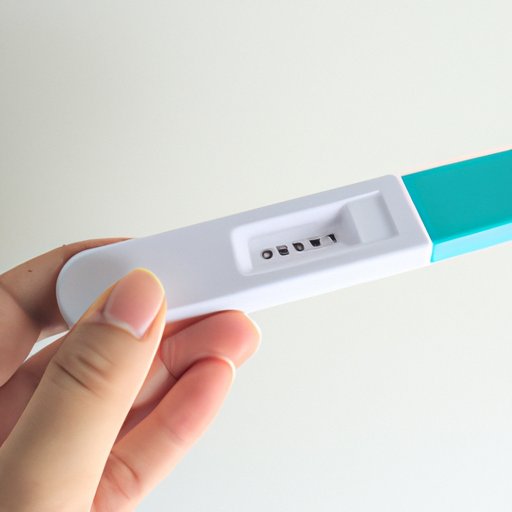Introduction
Finding out that you are pregnant can be an exciting and overwhelming experience. But how early can you tell if you are pregnant? Early detection of pregnancy is important for both the mother and her baby, as it allows for timely medical care and better health outcomes. In this article, we will explore the signs and symptoms of early pregnancy, how to take a home pregnancy test, what to expect in the first trimester, when to see a doctor, the benefits of early detection, and tips for managing stress during pregnancy.
Symptoms of Early Pregnancy
When you first become pregnant, your body undergoes many changes. It is important to be aware of these changes so you can recognize the signs of early pregnancy. Common physical symptoms include nausea, fatigue, breast tenderness, increased urination, and food cravings or aversions. Emotional symptoms, such as mood swings, irritability, and anxiety, are also common. It is important to note that each woman may experience these symptoms differently.

How to Take a Home Pregnancy Test
Home pregnancy tests are a convenient way to determine if you are pregnant. These tests measure the amount of human chorionic gonadotropin (hCG) in your urine. This hormone is produced in the placenta shortly after fertilization. There are several types of home pregnancy tests available, including digital tests, strip tests, and midstream tests. They vary in accuracy and sensitivity, so it is important to read the instructions carefully before taking the test.
Most home pregnancy tests will provide results within minutes. It is important to interpret the results correctly. A positive result indicates that you are likely pregnant, while a negative result indicates that you are likely not pregnant. If you receive a faint positive or negative result, you should repeat the test with a new kit.

What to Expect in the First Trimester
The first trimester of pregnancy is a time of significant changes for both the mother and her baby. During this period, the embryo’s organs and systems begin to develop. The mother’s body also undergoes many changes, such as increased levels of hormones, weight gain, and nausea. It is important to pay attention to your body and get enough rest during this time.
In addition to physical changes, you may also experience emotional changes. You may feel overwhelmed and anxious, as well as excited and joyful. It is important to talk to your support system and seek help if needed.
When to See a Doctor
Once you have taken a home pregnancy test and received a positive result, it is important to make an appointment with your doctor. Your doctor can confirm the pregnancy with a blood test and assess any potential risks or complications. It is also important to discuss any medications you are taking, as some may not be safe during pregnancy.
The Benefits of Early Detection
Early detection of pregnancy has many benefits for both the mother and her baby. Regular prenatal care is essential for monitoring the health of both the mother and the baby. Early detection also allows for timely medical interventions if necessary. Additionally, early detection provides the mother with more time to prepare for the arrival of the baby and make lifestyle changes, such as quitting smoking or drinking.

Tips for Managing Stress During Pregnancy
Pregnancy can be a stressful time, but there are ways to manage your stress. Get plenty of rest and focus on eating healthy foods. Talk to your partner, family, or friends about your worries and concerns. Exercise regularly and practice relaxation techniques, such as yoga or deep breathing exercises. Seek professional help if needed.
Conclusion
Early detection of pregnancy is important for both the mother and her baby. Recognizing the signs and symptoms of early pregnancy, taking a home pregnancy test, and seeing a doctor for confirmation are all important steps. Once confirmed, regular prenatal care, lifestyle changes, and stress management are key for a healthy pregnancy and outcome for both the mother and her baby.
(Note: Is this article not meeting your expectations? Do you have knowledge or insights to share? Unlock new opportunities and expand your reach by joining our authors team. Click Registration to join us and share your expertise with our readers.)
